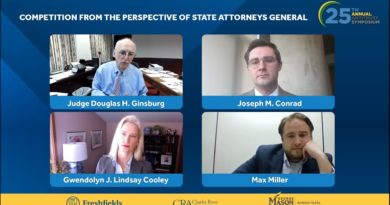Dawn Raids: The “New Normal” Since the Pandemic
Dawn raids are back with a vengeance. In October 2021, when COVID-19 restrictions were being lifted, EVP M. Vestager stressed that after a two-year hiatus mandated by the pandemic, dawn raids were back (see here for the speech). After carrying out dawn raids in the fashion and the wood pulp industries, she warned that this was “just the start”. The European Commission (Commission), together with national authorities, made good on their promises, and dawn raids are now back to pre-COVID levels.
But while dawn raids may be back, they have adapted to the new normal in how they are organized, along with who and what they target. This evolution is resulting in an uptick in litigation that forces courts across Europe to reassess the balance between the authorities’ legitimate interest in investigation and the rights of companies and individuals being targeted. This evolution is particularly relevant at a time when the Commission is updating its powers under Regulation 1/2003 and given the recent entry into force of the Digital Markets Act (DMA) and the Foreign Subsidy Regulation (FSR), both of which allow for dawn raids.
Dawn raids in hybrid work settings
The new way of working that many companies adopted since the pandemic also changed the way in which dawn raids operate. Long gone are the days in which documents related to secret cartels were stored by the participants in paper binders that competition authorities could seize and copy. Business data is now often stored in the cloud and can be accessed via various applications across several devices owned by the company or privately by its employees.
Accessing such data in the cloud proves to be complex for competition authorities, even when assisted by their own forensic experts. Identifying relevant information stored in the cloud takes more time and increasingly requires the active cooperation of investigated parties, heightening the risk of mishaps and resulting fines for non-compliance.
Next to centrally stored data such as emails and shared documents, competition authorities routinely request access to other means of communication such as company chats, private messaging conversations, or private emails and seize private devices such as smartphones and tablets. Private communications are not, and for privacy reasons often cannot be, monitored by employers. Yet, if employees destroy or tamper with such evidence, the employer may be held liable. In at least two separate cases, in Poland and The Netherlands, competition authorities imposed sizeable fines on companies whose employees had deleted WhatsApp conversations, or exited discussion groups, when they became aware of an imminent dawn raid.
When competition authorities raid company premises, they may often find that key employees are in fact increasingly working from home with their devices and possibly paper documents. To prevent any tampering with the evidence, competition authorities can carry out simultaneous inspections at individuals’ private homes. Home raids have always been a tool at the Commission’s disposal, but the frequency of remote working since the pandemic has revived interest in this possibility. The Commission (see here), and separately the French competition authority (see here), recently made use of these powers for the first time in recent memory. Raiding private homes is a much more intrusive measure in terms of the impact on privacy, reputation, and the distress it causes individuals and their families.
The drop in leniency applications impacts dawn raids
Since the EU’s leniency program was created in 1996, it became the primary source for detecting cartels, with 92% of the cartels investigated by the Commission between 2010 and 2017 originating in leniency according to a 2020 European Court of Auditors report. Already prior to the pandemic-mandated hiatus, there was a noticeable drop in leniency applications, mainly caused by the rise of private litigation, reducing the Commission’s ability to detect secret hardcore cartels.
Fewer leniency applications mean that dawn raids are launched with lower-quality information, making it harder to find reasonable grounds for an inspection, or making it more likely that an investigation is discontinued following the dawn raid. In fact, during the summer of 2023, the Commission closed investigations in the wood pulp (see here) and water infrastructure sectors (see here) after dawn raids conducted in the post-pandemic period.
As the Commission receives less (quality) information about hardcore cartels through the leniency program, it has widened the net as to the scope of the conduct subject to dawn raid inspections.
In 2023 only, the Commission carried out dawn raids in apparent abuse of dominance investigations, in the energy drinks and cardiovascular devices. National authorities have done the same in the e-bike sector and regularly carry out dawn raids in vertical cases, often related to resale price maintenance (such as recently in Spain, Greece, Belgium and the Netherlands, for example). The Commission has in this context stressed its intent to focus on other types of cartels in the future rather than targeting price-fixing cartels alone. It mentioned among others buyer cartels, no-poach agreements and cartels delaying quality or sustainability improvements.
Back to the Courts
With more dawn raids occurring, more decisions to carry out these tactics are being challenged in the Courts both at the EU and national level. Recent successes in annulling the dawn raids are likely to embolden further challenges.
In 2023, the CJEU annulled dawn raids concerning French supermarkets over the Commission’s failure to properly document the reasons for the dawn raids. At first instance, the General Court annulled the dawn raids in part only, finding that there was no reasonable suspicion to investigate one of the two allegations. On appeal, the CJEU entirely annulled the dawn raid decision, finding that the Commission failed to record interviews with third parties before the dawn raids and that the information obtained in these interviews could not be used. Since those unrecorded interviews were essential indicia on which the dawn raid decision relied, that decision had to be annulled.
Further challenges of dawn raid decisions are currently pending before the European courts concerning violations of the principles of proportionality, privacy, and the duty to state reasons (pending Symrise and Red Bull cases).
At the national level, dawn raid decisions are also regularly challenged, with varying success. For example, in 2023 Spain’s Supreme Court annulled dawn raids in the tobacco sector for failure to obtain prior judicial authorization, while Austria’s Supreme Cartel Court dismissed appeals concerning dawn raids in the wood pellet sector, finding that there were credible grounds for the raids.
Next frontier: privilege and privacy
We expect more judicial challenges of dawn raid decisions, contributing to clarifying the powers and constraints of competition authorities in combating anti-competitive behaviour.
One of the most disputed legal constructions is undisputedly legal professional privilege. Absent EU legislation, the current state of EU law denies privilege for in-house counsel. This position was set by the CJEU at a time when only a few EU countries recognized in-house privilege. More than fifteen years later, the balance has shifted with the majority of the Member States recognizing it (most recently France), raising the prospect that EU law should be updated. We seem to be one step further in lawyer-client privilege, where the CJEU has recently confirmed in Orde van de Vlaamse Balies that EU legal professional privilege protects the confidentiality of lawyer-client communications not only in relation to the exercise of the client’s rights of defence in the ongoing investigation but also in relation to legal advice more generally.
On another note, privacy questions continue to arise in the context of antitrust investigations where doubts grow as to the balance between obtaining the full picture in an investigation and rightfully protecting individuals’ personal data. In 2020, the General Court suspended a Commission request that would have obliged to run 2500 search terms and analyze more than 1 million documents, including highly private and/or personal data. Further to the suspension, the Commission agreed to limit its request and to pre-screen documents with sensitive private data in a virtual data room. The Commission’s solution was vetted by the General Court which dismissed the case for the remainder (see here).
It is clear that dawn raids will involve more and more private data from here on out due to the use of private devices and communication channels. The Commission will need to provide robust guarantees to respect privacy in order to safeguard the legality of its dawn raids.
_________
* The views and opinions set forth herein are the personal views or opinions of the authors, they do not necessarily reflect the views or opinions of the law firm with which they are associated.




